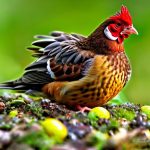Keeping chickens cool is essential for their health and productivity, particularly during hot weather. Chickens are vulnerable to heat stress due to their limited ability to regulate body temperature. Signs of heat stress in chickens include panting, reduced activity, and decreased appetite.
If not addressed, heat stress can lead to dehydration, lower egg production, and even mortality. Chicken owners should be proactive in managing their flock’s temperature. Effective strategies include providing adequate ventilation, creating shaded areas, offering cool treats, and closely monitoring the birds’ behavior.
These measures help maintain the chickens’ comfort and well-being during high temperatures. Chickens are more susceptible to overheating than mammals due to their physiological differences. Prolonged exposure to high temperatures can cause dehydration and overheating, potentially resulting in various health problems.
By recognizing the importance of temperature management and implementing appropriate cooling methods, chicken owners can safeguard their flock’s health and maintain consistent egg production throughout hot periods.
Table of Contents
- 1 Providing Proper Ventilation in the Coop
- 2 Using Shade and Insulation to Regulate Temperature
- 3 Offering Cool Treats and Fresh Water
- 4 Creating a Dust Bath Area for Natural Cooling
- 5 Monitoring and Managing Heat Stress in Chickens
- 6 Tips for Keeping Chickens Cool in Extreme Heat
- 7 FAQs
- 7.1 What are some ways to keep chickens cool in their coop?
- 7.2 How can I provide shade for my chickens in their coop?
- 7.3 What are some tips for improving ventilation in a chicken coop?
- 7.4 How often should I change the water for my chickens to keep them cool?
- 7.5 Are there specific breeds of chickens that are better suited for hot climates?
- 7.6 What are some signs that my chickens may be overheating?
Key Takeaways
- Keeping chickens cool is important for their health and well-being, especially in extreme heat.
- Proper ventilation in the coop is essential to allow for air circulation and prevent heat buildup.
- Using shade and insulation can help regulate the temperature inside the coop and provide relief from the heat.
- Offering cool treats and fresh water can help chickens stay hydrated and cool during hot weather.
- Creating a dust bath area for natural cooling allows chickens to regulate their body temperature and reduce heat stress.
Providing Proper Ventilation in the Coop
Why Ventilation Matters
Proper ventilation is crucial for keeping chickens cool and comfortable in their coop, especially during hot weather. Good airflow helps to remove excess heat and moisture from the coop, preventing the buildup of humidity and reducing the risk of heat stress in the flock.
Achieving Proper Ventilation
Ventilation can be achieved through windows, vents, and fans, which help to circulate air and maintain a comfortable temperature inside the coop. It’s essential for chicken owners to ensure that their coop is well-ventilated and free from drafts, as poor ventilation can lead to a range of health issues for the birds.
Using Fans for Additional Cooling
In addition to natural ventilation, chicken owners can also use fans to help keep their flock cool during hot weather. Fans can be placed strategically in the coop to improve air circulation and reduce the temperature inside the space. It’s important to ensure that fans are positioned safely and securely to prevent any accidents or injuries to the chickens. By providing proper ventilation in the coop, chicken owners can help their birds stay cool and comfortable, even during the hottest days of summer.
Using Shade and Insulation to Regulate Temperature

Providing adequate shade is essential for helping chickens stay cool during hot weather. Shade can be provided through natural sources such as trees or shrubs, or by using man-made structures such as awnings or tarps. By creating shaded areas in the chicken run or yard, chicken owners can help their flock escape the direct heat of the sun and reduce the risk of heat stress.
It’s important to ensure that there is enough shade available for all of the chickens to access at any given time, especially during the hottest part of the day. In addition to providing shade, insulation can also help regulate the temperature inside the coop and keep chickens cool. Insulation helps to maintain a consistent temperature inside the coop, preventing it from becoming too hot during the day and too cold at night.
Insulation can be added to the walls and roof of the coop to help keep it cool in the summer months. By using shade and insulation to regulate temperature, chicken owners can create a comfortable environment for their flock, even when temperatures soar.
Offering Cool Treats and Fresh Water
Offering cool treats and fresh water is a great way to help chickens beat the heat during hot weather. Cool treats such as frozen fruits and vegetables can provide a refreshing snack for chickens and help lower their body temperature. Watermelon, cucumbers, and frozen berries are all popular choices for cool treats that chickens enjoy.
In addition to cool treats, it’s important to ensure that chickens have access to fresh, clean water at all times. Dehydration is a common issue for chickens during hot weather, so it’s crucial for chicken owners to regularly check and refill water containers to keep their flock hydrated. In addition to providing cool treats and fresh water, chicken owners can also consider adding electrolytes to their chickens’ water to help them stay hydrated and healthy during hot weather.
Electrolytes can help replace essential minerals lost through sweating and panting, helping to prevent dehydration and heat stress in the flock. By offering cool treats and fresh water, chicken owners can help their birds stay cool and comfortable during the hottest days of summer.
Creating a Dust Bath Area for Natural Cooling
Creating a dust bath area is a natural way to help chickens stay cool during hot weather. Dust bathing is an important behavior for chickens, as it helps them keep their feathers clean and free from parasites. In addition to its hygiene benefits, dust bathing also helps chickens regulate their body temperature by allowing them to cool off in the dry soil or sand.
By providing a designated dust bath area in the chicken run or yard, chicken owners can encourage their flock to engage in this natural behavior and stay cool during hot weather. To create a dust bath area, chicken owners can simply designate a patch of dry soil or sand in the chicken run and keep it loose and free from debris. Chickens will instinctively use this area to dust bathe, helping them stay cool and comfortable during hot weather.
It’s important to ensure that the dust bath area is kept dry and replenished regularly to provide an effective cooling spot for the flock. By creating a dust bath area for natural cooling, chicken owners can help their birds beat the heat in a natural and instinctive way.
Monitoring and Managing Heat Stress in Chickens

Recognizing the Signs of Heat Stress
Chicken owners must be vigilant for signs of heat stress in their flock, such as panting, lethargy, reduced appetite, and drooping wings. If any of these signs are observed, it’s essential to take immediate action to help cool down the chickens and prevent further heat-related issues.
Proactive Measures to Combat Heat Stress
Providing shade, cool treats, fresh water, and ensuring proper ventilation in the coop can help mitigate the effects of heat stress. These proactive measures can go a long way in keeping chickens comfortable and healthy during hot weather.
Having a Plan in Place for Managing Heat Stress
In addition to proactive measures, it’s crucial for chicken owners to have a plan in place for managing heat stress in their flock. This may include having a designated cooling area with misters or fans, providing electrolytes in their water, or even bringing them indoors if temperatures become dangerously high. By being prepared, owners can help prevent serious health issues and ensure the well-being of their flock during hot weather.
Tips for Keeping Chickens Cool in Extreme Heat
During extreme heat waves, it’s important for chicken owners to take extra precautions to keep their flock cool and comfortable. This may include providing additional shade in the chicken run or yard, using misters or fans to create a cooling breeze, or even bringing them indoors if temperatures become dangerously high. It’s also important to regularly check on the chickens throughout the day to ensure they are coping with the heat effectively.
In extreme heat, it’s crucial for chicken owners to prioritize hydration for their flock by ensuring they have access to plenty of fresh water at all times. Adding electrolytes to their water can also help replace essential minerals lost through sweating and panting. Additionally, offering cool treats such as frozen fruits and vegetables can provide a refreshing snack for chickens and help lower their body temperature.
Another tip for keeping chickens cool in extreme heat is to adjust feeding times to avoid feeding them during the hottest part of the day. Feeding them early in the morning or later in the evening when temperatures are cooler can help reduce their metabolic heat production and keep them more comfortable. In conclusion, keeping chickens cool during hot weather is essential for maintaining their health and well-being.
By providing proper ventilation in the coop, using shade and insulation to regulate temperature, offering cool treats and fresh water, creating a dust bath area for natural cooling, monitoring and managing heat stress in chickens, and following tips for keeping chickens cool in extreme heat, chicken owners can help their flock stay comfortable and healthy even when temperatures soar. It’s important for chicken owners to be proactive in preventing heat stress in their flock by taking these measures seriously and being vigilant for signs of heat-related issues. By prioritizing their chickens’ comfort and well-being during hot weather, owners can ensure that their flock stays happy and healthy throughout the summer months.
If you’re looking for tips on how to keep chickens cool in their coop during hot weather, you might want to check out this article on chicken coop portage. It offers valuable advice on how to design and maintain a coop that provides adequate ventilation and shade to keep your chickens comfortable in the heat.
FAQs
What are some ways to keep chickens cool in their coop?
Some ways to keep chickens cool in their coop include providing shade, good ventilation, and access to cool water.
How can I provide shade for my chickens in their coop?
You can provide shade for your chickens in their coop by using tarps, umbrellas, or planting trees or shrubs around the coop to create natural shade.
What are some tips for improving ventilation in a chicken coop?
To improve ventilation in a chicken coop, you can install windows, vents, or fans to allow for better air circulation. It’s important to ensure that there is a good flow of fresh air without creating drafts.
How often should I change the water for my chickens to keep them cool?
You should change the water for your chickens at least once a day, especially during hot weather, to ensure that they have access to cool, fresh water.
Are there specific breeds of chickens that are better suited for hot climates?
Yes, some chicken breeds are better suited for hot climates, such as the Leghorn, Rhode Island Red, and Sussex. These breeds are known for their heat tolerance and ability to thrive in warmer temperatures.
What are some signs that my chickens may be overheating?
Signs that your chickens may be overheating include panting, holding their wings away from their bodies, and reduced egg production. It’s important to take action to cool them down if you notice these signs.
Meet Walter, the feathered-friend fanatic of Florida! Nestled in the sunshine state, Walter struts through life with his feathered companions, clucking his way to happiness. With a coop that’s fancier than a five-star hotel, he’s the Don Juan of the chicken world. When he’s not teaching his hens to do the cha-cha, you’ll find him in a heated debate with his prized rooster, Sir Clucks-a-Lot. Walter’s poultry passion is no yolk; he’s the sunny-side-up guy you never knew you needed in your flock of friends!







